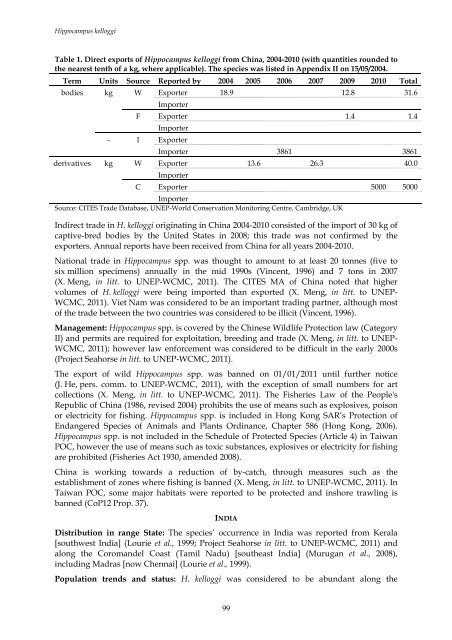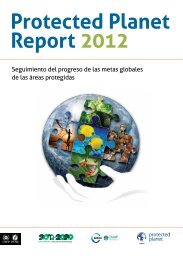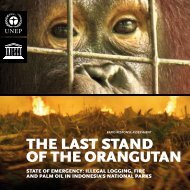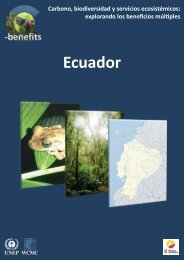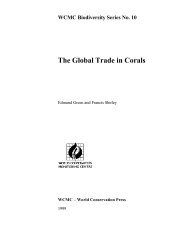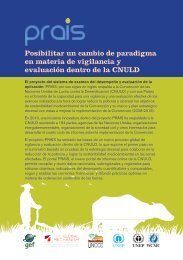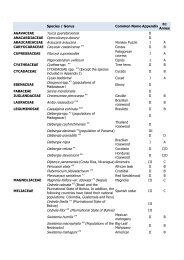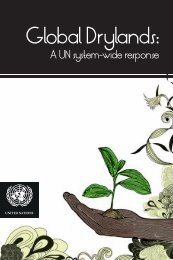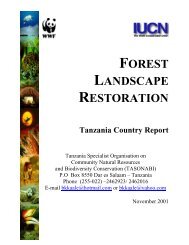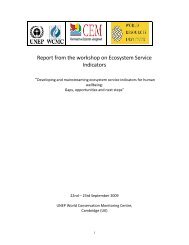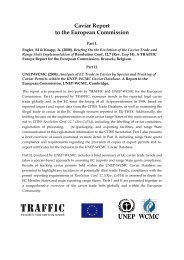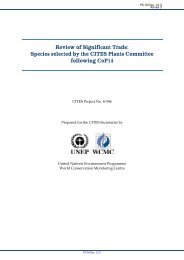2012. Review of Significant Trade - Cites
2012. Review of Significant Trade - Cites
2012. Review of Significant Trade - Cites
Create successful ePaper yourself
Turn your PDF publications into a flip-book with our unique Google optimized e-Paper software.
Hippocampus kelloggi<br />
Table 1. Direct exports <strong>of</strong> Hippocampus kelloggi from China, 2004-2010 (with quantities rounded to<br />
the nearest tenth <strong>of</strong> a kg, where applicable). The species was listed in Appendix II on 15/05/2004.<br />
Term Units Source Reported by 2004 2005 2006 2007 2009 2010 Total<br />
bodies kg W Exporter 18.9 12.8 31.6<br />
Importer<br />
F Exporter 1.4 1.4<br />
Importer<br />
- I Exporter<br />
Importer 3861 3861<br />
derivatives kg W Exporter 13.6 26.3 40.0<br />
Importer<br />
C Exporter 5000 5000<br />
Importer<br />
Source: CITES <strong>Trade</strong> Database, UNEP-World Conservation Monitoring Centre, Cambridge, UK<br />
Indirect trade in H. kelloggi originating in China 2004-2010 consisted <strong>of</strong> the import <strong>of</strong> 30 kg <strong>of</strong><br />
captive-bred bodies by the United States in 2008; this trade was not confirmed by the<br />
exporters. Annual reports have been received from China for all years 2004-2010.<br />
National trade in Hippocampus spp. was thought to amount to at least 20 tonnes (five to<br />
six million specimens) annually in the mid 1990s (Vincent, 1996) and 7 tons in 2007<br />
(X. Meng, in litt. to UNEP-WCMC, 2011). The CITES MA <strong>of</strong> China noted that higher<br />
volumes <strong>of</strong> H. kelloggi were being imported than exported (X. Meng, in litt. to UNEP-<br />
WCMC, 2011). Viet Nam was considered to be an important trading partner, although most<br />
<strong>of</strong> the trade between the two countries was considered to be illicit (Vincent, 1996).<br />
Management: Hippocampus spp. is covered by the Chinese Wildlife Protection law (Category<br />
II) and permits are required for exploitation, breeding and trade (X. Meng, in litt. to UNEP-<br />
WCMC, 2011); however law enforcement was considered to be difficult in the early 2000s<br />
(Project Seahorse in litt. to UNEP-WCMC, 2011).<br />
The export <strong>of</strong> wild Hippocampus spp. was banned on 01/01/2011 until further notice<br />
(J. He, pers. comm. to UNEP-WCMC, 2011), with the exception <strong>of</strong> small numbers for art<br />
collections (X. Meng, in litt. to UNEP-WCMC, 2011). The Fisheries Law <strong>of</strong> the People's<br />
Republic <strong>of</strong> China (1986, revised 2004) prohibits the use <strong>of</strong> means such as explosives, poison<br />
or electricity for fishing. Hippocampus spp. is included in Hong Kong SAR’s Protection <strong>of</strong><br />
Endangered Species <strong>of</strong> Animals and Plants Ordinance, Chapter 586 (Hong Kong, 2006).<br />
Hippocampus spp. is not included in the Schedule <strong>of</strong> Protected Species (Article 4) in Taiwan<br />
POC, however the use <strong>of</strong> means such as toxic substances, explosives or electricity for fishing<br />
are prohibited (Fisheries Act 1930, amended 2008).<br />
China is working towards a reduction <strong>of</strong> by-catch, through measures such as the<br />
establishment <strong>of</strong> zones where fishing is banned (X. Meng, in litt. to UNEP-WCMC, 2011). In<br />
Taiwan POC, some major habitats were reported to be protected and inshore trawling is<br />
banned (CoP12 Prop. 37).<br />
INDIA<br />
Distribution in range State: The species’ occurrence in India was reported from Kerala<br />
[southwest India] (Lourie et al., 1999; Project Seahorse in litt. to UNEP-WCMC, 2011) and<br />
along the Coromandel Coast (Tamil Nadu) [southeast India] (Murugan et al., 2008),<br />
including Madras [now Chennai] (Lourie et al., 1999).<br />
Population trends and status: H. kelloggi was considered to be abundant along the<br />
99


